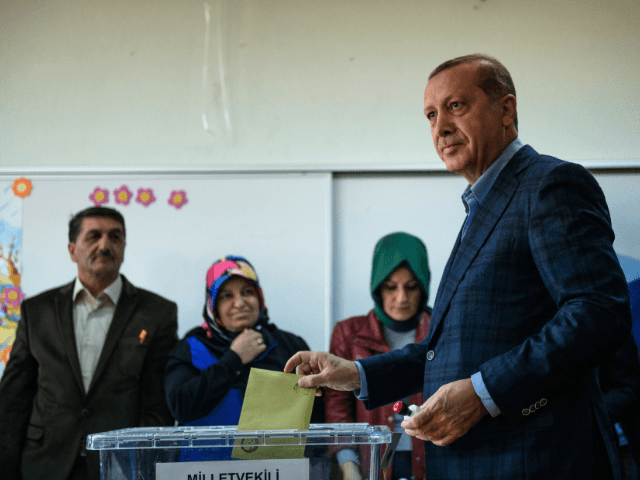Those who suspect the surprise victory of the ruling Justice and Development Party (AKP) in Turkey’s national elections Sunday was fraudulent may have more evidence to support their theory: the astronomical increase in registered voters between the last election in June and Sunday’s referendum.
Writing in Commentary, American Enterprise Institute scholar Michael Rubin notes that more than two million voters seemed to have materialized in election lists between June and November 2015. Rubin notes that two million voters were added to rolls between 2011 and 2015–fewer, in fact, than in the past five months. Unlike the United States, Turkish voter registration occurs automatically through a citizen identification number provided at birth, discarding the possibility that a special election galvanized Turks to register to vote in droves. Anyone over the age of 18 who wants to vote is already registered.
The wide discrepancy in new voters Rubin has identified echoes concerns from high-ranking members of the opposition Republican People’s Party (CHP), who told the Turkish newspaper Zaman on Sunday that they feared voter registration scrolls had been altered to benefit the AKP. The party noted that more than 600,000 people had “disappeared” from voter registries and 400,000 added. As the party does not have identifying information on those people regarding their party, they must assume those removed had died in between the two elections and those added had just turned 18 years old.
Daniel Pipes of the Middle East Forum adds some clarity to what effect these voters may have had, noting that the AKP received nine percent more votes between June and November.
Rubin suggests that a reason for the massive growth in voter numbers could be that the AKP “registered people in multiple centers, so that they could vote twice (or more).”
Vote and Beyond, an independent election monitoring group active during Sunday’s election, reported that they indeed identified election discrepancies during their tour of Turkish election facilities. They described the discrepancies as “minor incompliances,” however, having found their tally differed from the government’s by 10,000 votes. “We spotted a discrepancy of 10,000 out of the total 48,000,000 votes cast across Turkey,” their statement read, noting that they did not believe this difference was non-negligible, and that it was reasonably similar to the discrepancies found in the June election.
The AKP, the party of President Recep Tayyip Erdogan, received almost 50 percent of the vote in Sunday’s election, allowing it to govern without forming a coalition government. The People’s Democratic Party (HDP), the leftist pro-Kurdish party largely responsible for diminishing the AKP’s vote in June, barely stayed in Parliament with ten percent of the vote. Violence against government opposition and pro-Kurdish groups forced HDP candidates to cancel any public rallies for fear of creating a target for terrorists; candidates campaigned in their districts door-to-door.
In Diyarbakir, Turkey’s largest Kurdish stronghold city, protesters were attacked with water cannons and tear gas following the announcement of the results of that election. Images surfacing from inside the city showed anti-AKP protesters armed with stones and vehicles in flames on the streets. Diyarbakir is currently under a mandatory curfew to curb violence.
While the AKP’s victory took many by surprise, the political climate in the country has changed dramatically between June’s elections and the November 1 ballot. Turkey suffered what is being called the deadliest terror attack in post-Ottoman history on October 10, when two suicide bombers allegedly linked to the Islamic State targeted a left-wing Kurdish peace rally in Ankara. Months earlier, the brother of one of the Ankara bombers triggered airstrikes against ISIS and Kurdish targets by Turkey in Syria with the bombing of a similar meeting of leftist Kurdish leaders in Suruç, a southern border town near the highly contested Syrian town of Kobani. Those targeted in the attack were planning a humanitarian aid visit to Kobani when they were attacked.

COMMENTS
Please let us know if you're having issues with commenting.